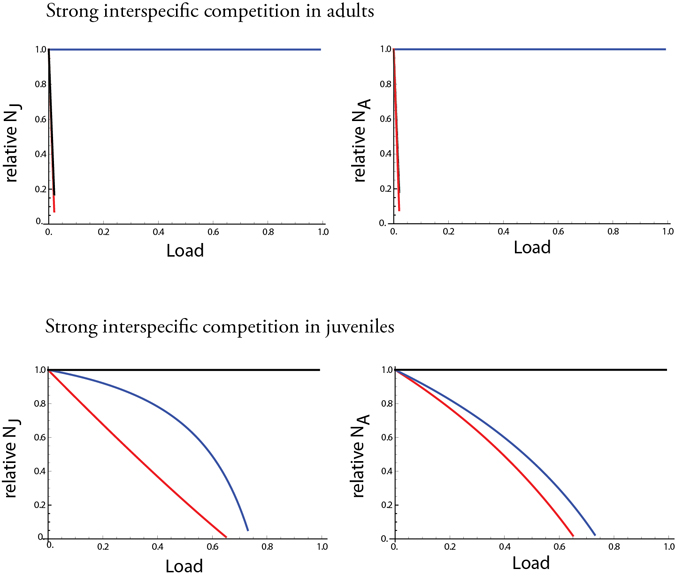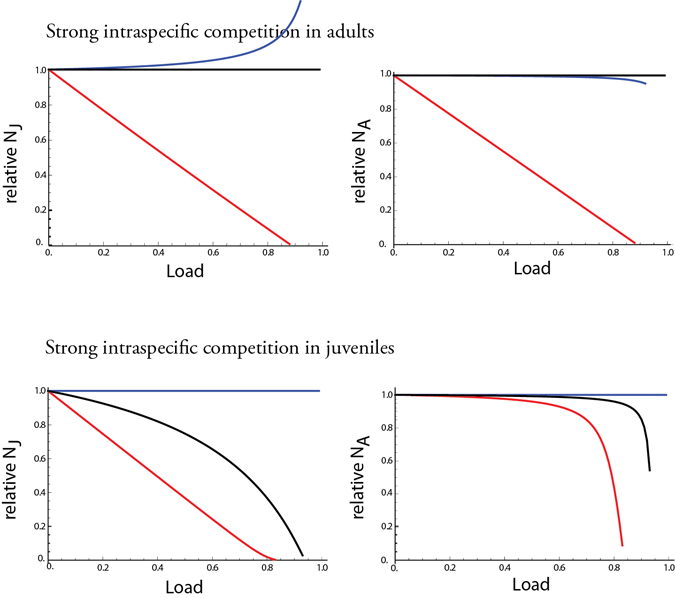
Full text loading...
Many multicellular eukaryotes have reasonably high per-generation mutation rates. Consequently, most populations harbor an abundance of segregating deleterious alleles. These alleles, most of which are of small effect individually, collectively can reduce substantially the fitness of individuals relative to what it would be otherwise; this is mutation load. Mutation load can be lessened by any factor that causes more mutations to be removed per selective death, such as inbreeding, synergistic epistasis, population structure, or harsh environments. The ecological effects of load are not clear-cut because some conditions (such as selection early in life, sexual selection, reproductive compensation, and intraspecific competition) reduce the effects of load on population size and persistence, but other conditions (such as interspecific competition and load on resource use efficiency) can cause small amounts of load to have strong effects on the population, even extinction. We suggest a series of studies to improve our understanding of the effects of mutation load.

Article metrics loading...

Full text loading...


Data & Media loading...
Supplemental Material
Download all Supplemental Material as a PDF. Includes Supplemental Text 1: The Ecological Effects of Mutation Load, Supplemental Figure 1 (also reproduced below), and Supplemental Figure 2 (also reproduced below) Supplemental Figure 1. The relative population size (i.e., the population size with load divided
by the size of an otherwise similar unloaded population) under various types of load and strong
interspecific competition. The red lines show results for load on the fecundity rate b, the blue
lines show results for load on juvenile resource acquisition rate, and the black lines are for load
on adult acquisition rate. When load affects acquisition, it affects the ability of the organism to
acquire both its favored and less favored resource. In each case, the life stage that experiences
interspecific competition for resources has c = 0.9. The default parameters for these graphs have
equal parameters for both species b = 1, d = 0.1, m = 1, a = 1, c = 0 for the intraspecific
competition stage, I = 10,000 for the stage with intraspecific competition and I = 1000 for the
stage with interspecific competition. Thus the interspecific competition is much more important
in determining the equilibrium population size, but equilibrium size depends strongly on load on
acquisition rate during interspecific competition. Load on fecundity or on acquisition rate during
interspecific competition can have strong effects on equilibrium population size, largely
unaffected by the weak intraspecific competition during the other life stage. Supplemental Figure 2. The relative population size (i.e., the population size with load divided
by the size of an otherwise similar unloaded population) under various types of load and strong
intraspecific competition. The red lines show results for load on the fecundity rate b, the blue
lines show results for load on juvenile resource acquisition rate, and the black lines are for load
on adult acquisition rate. When load affects acquisition, it affects the ability of the organism to
acquire both its favored and less favored resource. In each case, the other life stage experiences
interspecific competition for resources with c = 0.9. The default parameters for these graphs have
equal parameters for both species b = 1, d = 0.1, m = 1, a = 1, c = 0 for the intraspecific
competition stage, I = 1000 for the stage with interspecific competition and I = 100 for the stage
with intraspecific competition. Thus the intraspecific competition is much more important in
determining the equilibrium population size. In such a case, the acquisition rate is relatively
unimportant, much as predicted from the one-stage intraspecific competition models. Load on
fecundity affects numbers of juveniles at equilibrium almost proportionately, but fecundity load
has weak effects on adult numbers if there is strong intraspecific competition on juveniles. 

